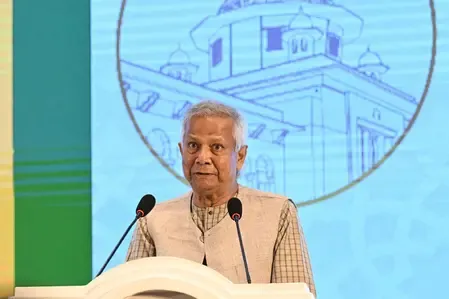Has the Yunus-led Regime Surrendered Bangladesh's Defence Autonomy?

Synopsis
Key Takeaways
- Bangladesh has compromised its defence autonomy for a modest tariff cut.
- A covert NDA with the US prohibits military purchases from China and Russia.
- The military's reliance on foreign technology makes it vulnerable to geopolitical changes.
- Economic implications could disrupt key industries and cause inflation.
- The shift in foreign policy undermines Bangladesh's historical non-alignment.
Dhaka, Aug 3 (NationPress) Bangladesh's Chief Adviser, Muhammad Yunus, has positioned himself at the helm of an “interim government” through clandestine agreements with deep-state players and international backers. Operating without any constitutional authority, Yunus governs in a shroud of secrecy, culminating in a covert Non-Disclosure Agreement (NDA) with the US.
According to a report by NorthEast News, Bangladesh has relinquished its defence autonomy, forsaken critical partnerships, and consented to a lopsided alliance that jeopardizes the nation's sovereignty, all for a modest tariff cut. This agreement has led to an NDA that prohibits Bangladesh from acquiring military assets from its defence collaborators, China and Russia. Rather than a diplomatic partnership, this represents a unilateral forfeiture of strategic flexibility, quietly signed and misleadingly termed a victory.
Recently, US Charge d’Affaires Tracey Ann Jacobson visited the Armed Forces Division in Dhaka, as reported by multiple credible sources. In a private meeting with the Principal State Officer, Jacobson allegedly issued a warning: any continued military transactions with Russia or China could result in sanctions against the Bangladesh Armed Forces. Yunus received a similar caution.
Bangladesh's military, consisting of the Army, Air Force, and Navy, is fundamentally reliant on defence technologies from Russia and China. The report warns that a significant portion of Bangladesh's defence structure would collapse if these nations ceased military assistance, spare parts, or logistical support in response to this betrayal.
This decision has left Bangladesh's military vulnerable to geopolitical repercussions. The interim administration's choice not only impacts defence but also has dire economic ramifications. Key industries, especially garments, rely heavily on Chinese inputs, with Chinese supply chains forming the lifeblood of Bangladesh's economy. A shift towards the US could provoke retaliatory trade actions from China, potentially disrupting production, spurring inflation, or even initiating a supply crisis in Bangladesh.
The Yunus-led government has opted to purchase 25 Boeing aircraft at inflated prices and acquire overpriced wheat from the US under bundled agreements. The interim leadership has traded strategic independence for transactional subservience, as reported. Previously, Bangladesh maintained a delicate yet effective balance in its foreign relations. The former government under Sheikh Hasina adeptly navigated ties with India while simultaneously engaging with China, Russia, and the US.
Within just one year, the Yunus regime has upended Bangladesh's carefully crafted non-alignment, reducing the nation to a one-dimensional client state. The NDA does not signify a shift in allegiance but rather a dismantling of choices. It diminishes Bangladesh’s military to a dependent entity, its economy to a hostage of external goodwill, and its sovereignty to a pawn in another nation’s strategic calculus. This is not merely a policy misstep; it is a national betrayal, representing the deliberate dismantling of sovereignty, sealed with ink and misrepresented as a triumph.










